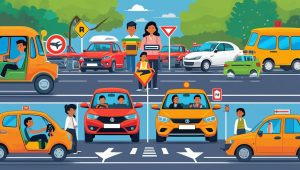📌 Introduction: Why Road Safety Rules Are Changing
India faces a major road safety crisis, with over 1.5 lakh fatalities annually due to road accidents. In response, the Indian government introduced new amendments and enforcement strategies under the Motor Vehicles (Amendment) Act, 2019 and subsequent rules in 2021–2024. That’s why Govt. change the rules and make New Road Safety Rules.
These reforms aim to reduce accidents, enforce discipline, and modernize traffic governance. For drivers, both private and commercial, these changes have significant consequences.
At Hubert Ebner India, we empower drivers and transport professionals to stay compliant, safe, and informed.
⚖️ Key Changes in New Road Safety Rules: What’s New?
Here are the most impactful reforms introduced:
1. 🚫 Higher Penalties for Violations
| Offense | Old Fine (₹) | New Fine (₹) |
|---|---|---|
| Driving without license | 500 | 5,000 |
| Over-speeding | 400 | 1,000–2,000 |
| Drunken driving | 2,000 | 10,000 |
| Without helmet | 100 | 1,000 + disqualification |
| Not wearing seatbelt | 100 | 1,000 |
| Juvenile driving | N/A | ₹25,000 + imprisonment + vehicle seizure |
💡 Impact: Strong deterrence against negligent behavior and better enforcement through CCTV and e-challan systems.
🧰 2. Vehicle Safety Standards & Tech Mandates
New mandates include:
- Airbags compulsory for front passengers in all new vehicles
- ABS (Anti-lock Braking System) for two-wheelers above 125cc
- Speed Governors for commercial vehicles
- Crash testing norms aligned with global standards
- Mandatory reverse parking sensors in some categories
💡 Impact: Manufacturers and drivers must ensure vehicle compliance. Commercial fleets are advised to upgrade outdated vehicles.
🧒 3. Protection for Children & Passengers
- Helmets are now mandatory for children aged 9+ on two-wheelers
- Child restraint systems (car seats) for 6-year-olds and below
- Stricter rules for school buses and van drivers, including police verification and training
💡 Impact: Parents, school drivers, and fleet owners must take responsibility for safe transport practices.
🧑⚖️ 4. Penalties for Aggregators & Fleet Operators
Taxi aggregators like Uber, Ola, and fleet operators face:
- Regulation under new licensing rules
- Fines for unverified drivers or excess fare charging
- Accountability for safety lapses or customer complaints
- Need for proper training, background checks, and digital compliance
💡 Impact: Fleet managers must regularly train drivers and update compliance documentation.
🔄 5. Emphasis on Driver Training & Refresher Programs
India’s new rules stress driver education as a preventive measure. Rules encourage:
- Regular driver refresher courses
- Certification for commercial and transport drivers
- Use of simulators and behavioral training
- Mandatory training for license renewals in some states
💡 Hubert Ebner India offers certified training programs tailored to these needs — helping reduce violations and accidents.
📲 6. Digital Enforcement & Monitoring
The Ministry of Road Transport and Highways (MoRTH) introduced:
- e-Challan systems linked to VAHAN & SARATHI databases
- Integration with DigiLocker and mParivahan apps
- GPS & telematics in fleet vehicles for monitoring behavior
- Digital license & registration tracking
💡 Impact: Drivers must keep digital records updated, and fleet companies need telematics-based compliance strategies.
👥 7. Good Samaritan Law & Accident Response
The new rules include protection for bystanders helping accident victims:
- No harassment or legal obligation
- Can remain anonymous
- Encouraged to report and assist without fear
💡 Impact: Promotes citizen participation and faster accident response times.
🚧 8. Infrastructure & Speed Enforcement
- Speed limits now differ by road type (urban, rural, expressway)
- Use of AI-based cameras, automated signals, and speed radars
- Fines issued digitally with evidence snapshots
💡 Impact: Drivers must be aware of varying speed zones and cannot rely solely on outdated signage.
🧠 What Should Drivers & Fleet Operators Do?
✅ Stay Updated
- Regularly check MoRTH updates
- Read new circulars and state rules
✅ Attend Training
- Enroll in driver safety programs
- Conduct internal audits for violations
✅ Maintain Records
- Digital copies of DL, RC, insurance, PUC
- Periodic health checks (especially for commercial drivers)
✅ Adopt Safe Practices
- Avoid phone use while driving
- Obey signals and lane discipline
- Encourage reporting of unsafe conditions
🏁 Conclusion: Compliance = Safer Roads
India’s new road safety rules reflect a serious commitment to reducing accidents and saving lives. But these rules are only as effective as the drivers who follow them.
At Hubert Ebner India, we specialize in:
- Driver training for commercial fleets
- Safety workshops for logistics, school transport, and corporates
- Compliance assistance and documentation audits
- Simulation-based hazard perception training
📞 Partner With Hubert Ebner India
Let’s build a culture of safe, legal, and aware driving across India.
📍 Hubert Ebner India Pvt. Ltd.




